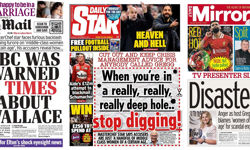In a chilly economic climate, newspapers are really struggling. That's not simply an opinion; it's the evidence of the latest financial results from the UK's quoted newspaper groups, and some of the privately owned groups that release figures, too.
DMGT
In a Bloomberg interview at the time of DMGT's results, finance director Peter Williams said the environment was the worst he has seen in his time with the group - and he's been with DMGT since the late 1980s.
DMGT is fortunate to have diversified into B2B information. The group was able to maintain its final dividend, thanks to the nearly two thirds of operating profit generated from businesses other than the print newspaper titles. Revenue for the group as a whole was up 3% while pretax profits fell 9% over the year.
But look at the newspaper businesses - Northcliffe, the regional papers business, and Associated Newspapers which runs the national titles - and you can see the difficulties that newspapers are facing. DMGT has diversified out of print - and online now accounts for a third of all advertising income.
Looking at the papers, even though the Mail titles have been gaining market share, weekly circulation revenues are down 3%.
It's advertising though that is the real problem. In the year to September 2008, recruitment advertising fell 40% and property 50%. There has been further deterioration since. Associated Newspapers' advertising revenue is down 10% since September, and Northcliffe saw a fall in advertising of 28% in October.
Northcliffe's profits fell by more than a quarter last year from £93m to £68m, and according to City analysts, it's not likely it will do much better next year. Meanwhile, the company says it is aiming to save money through cutting returns, and renegotiating newsprint deals, as well as through creating a new regional operating structure for Northcliffe which should remove significant costs.
Trinity Mirror
Trinity Mirror recently announced its interim results for the six months to the end of October 2008. These show that trading continues to deteriorate. Revenue decline has accelerated from 7.7% to 12.8%. While circulation revenues fell 5%, advertising has fallen by a fifth - with particularly bad performance coming from property, down 42.6%, but motors and recruitment also falling by more than a quarter. Even display advertising is down, though less dramatically affected.
Like DMGT, Trinity Mirror's management is putting its faith in cost cuts to ensure it remains profitable. £25m is to be taken out of the cost base this year and a further £20m in 2009.
Johnston Press
Johnston Press, the third of the listed newspaper stocks, saw a 16% fall in operating profits in the first half of the year, on a 6% decline in revenues. It decided not to pay an interim dividend, and warned that the final dividend would depend on trading performance; some analysts are not expecting it to pay one.
Since then, as the recent management statement shows, things have got worse. The decline in advertising revenues, for instance, has accelerated from 9.5% in the first half to 15.5% for the 44 weeks to 1st November. Property advertising has halved, and recruitment ads are down by a third.
Johnston Press is particularly exposed to the downturn in the advertising market; advertising accounts for about 80% of its revenue, a much higher percentage than at Trinity Mirror. Margins have already fallen from 30.9% in the first half of last year to 27.8% this time round, and analysts expect them to be no more than 20% by 2010.
Although the UK has only three Stock Exchange listed newspaper companies, privately owned group Archant discloses its financial results, as does the Financial Times group, a subsidiary of media company Pearson. Independent News & Media also discloses figures for its UK interests, of which the Independent newspaper makes a major part. Guardian Media Group also reports figures, but its most recent set of results was for the period to March 2008, so it doesn't give a fully up-to-date picture of group performance.
Archant
The news from Archant backs up the picture of regional newspapers in trouble - the chairman refers to "significantly weakening conditions" and there were declines in all the major advertising categories. Archant's latest results were for the 26 weeks to 26th June 2008 (see footnote), so they are a bit less up-to-date than the recent announcements from the other companies.
Even by June, revenues for the group were down 3%, with operating profit down nearly 9%. Archant did, however, maintain its interim dividend payment.
Financial Times
The one bright spot in the newspaper universe seems to be the Financial Times - intriguing given the banking turmoil and crashing stock markets that have characterised the last year. The FT maintained its circulation, and the group saw advertising revenues up 2% in the first half of the year - the only newspaper group to show an increase - but admits that "advertising revenues remain difficult to predict"; management believes the group can achieve profit growth on flat advertising sales.
For the group as a whole, revenues rose 8% and operating profit increased by 13%. But if that looks like good news for newspapers, you need to read the small print - much of this growth has been achieved by selling print properties such as Les Echos, the French business paper, and investing in online data sources such as Mergermarket and Money-Media instead.
Though recruitment advertising has been hit hard, the FT has done well in luxury consumer advertising, including ads in its How to Spend It magazine. It remains to be seen how the luxury goods sector will react to a continuing recession.
The Independent
Independent News & Media's figures for the first half of 2008 showed revenue up 3% and operating profit up nearly 9% - with a rise in net profits of nearly a third. The fact that the dividend wasn't increased, though, suggests management doesn't expect good conditions to last much longer. But look at UK Publishing, which contains the Independent's figures, and you see a very different picture. UK circulation was down 5.4%, and advertising down 7.7%.
The big trends are unmistakable. Advertising is doing badly; and as Tim Nollen, the media analyst at JP Morgan points out, national papers are outperforming local papers, which are finding the going particularly difficult. At DMGT, for instance, retail sector advertising has been holding up well - though that may not last long given the state of the High Street at the moment. DMGT's fall in advertising of 10% at national titles, and the Independent's of 7.7%, contrast with recent falls at Northcliffe and Johnston Press of 30% and 15% respectively.
Newspapers have also been increasing their cover prices to boost their circulation income. But that hasn't stopped circulation revenues from falling at most groups as volumes continue to drop. Still, with falls in single figures, circulation remains a far more stable source of income than advertising.
Digital growth slowing
Digital remains the lone growth area for all the newspapers. Archant, for instance, saw visitors to homes24 more than double in the first half, despite the property market slowdown, and the relaunch of Independent.co.uk saw hits double. But Edward Hill-Wood, media analyst at Morgan Stanley, warns, "You are starting to see quite a slowdown in online activity." Most groups are still achieving 20-30% growth, but that has already slowed, and may well slow further. Besides, at some groups the contribution of digital media is still marginal - at Independent News & Media, online still represents only 4% of total publishing advertising revenue.
Slashing costs
Cost cuts are another big trend. But it's not a case of increasing profits by cutting costs - it's more a question of running hard to stand still. In the case of DMGT, Citi's analyst team reckons that there is about £126m of 'cost cushion' offsetting an expected £92m of downward pressure - so despite the cost cuts, the team isn't increasing its forecasts.
And papers aren't in control of all their costs. Alastair Reid, the analyst at UBS, points out that Norske Skog is likely to increase newsprint prices by 20% in 2009 - putting further pressure on profit margins.
The debt burden
The most important figures in these results, though, might not be in the profit and loss account at all. Sector balance sheets look shaky. While none of DMGT's debt needs to be repaid or rescheduled until 2012, Johnston Press and Trinity Mirror have large amounts of debt and will need to repay it - or, more realistically, arrange for fresh borrowings - within the next two years.
To its credit, Johnston Press management has already taken action to reduce its debt. The company financed its 2006 acquisition of the Scotsman titles by borrowings, but has already cut its debt from £692m to £465m by a share placing. It has also stopped paying a dividend, keeping its cash flow to pay down debt.
However, the group's remaining debt needs to be refinanced before 2010 - not an easy task given the current tight credit environment. Alex de Groote, media analyst with Panmure Gordon, suggests the group may end up having to sell its Scottish newspapers to survive. That is, assuming it can find a buyer.
Alternatively, the banks might force a debt for equity swap; but that could wipe shareholders out, by diluting their stake in the company heavily.
Reflecting the poor advertising market and the companies' debt problems, share prices have tumbled over the last year - Johnston Press, for instance, has fallen from 94p in May to 6.5p in November last year, and is valued at only three times forecast earnings. Lorna Tilbian, media analyst at Numis, says, "pure consumer publishers have seen much of their equity value wiped out by cyclical weakness and high leverage."
And Edward Hill-Wood, media analyst at Morgan Stanley, warns: "The outlook is indeed dire. It has been getting worse for some time now. We enter 2009 in an incredibly downbeat and pessimistic manner."
But, he says, the stock market already expects the worst - so that share prices have built in the expectation that advertising will fall 20% next year. He recently pointed out that the average price earnings ratio (PER) for the sector - the main valuation criteria for shares - was 40% below the lows reached in earlier recessions. Share prices have since bounced, with DMGT rising from 240p to 313p, and he still feels there may be value in the sector.
Johnston Press and Trinity Mirror currently trade on price earnings ratios around 3.5 times. That compares to nearly eight times for the media sector as a whole. Clearly, the City doesn't consider newspapers an attractive investment, compared to other media sectors. The discount to the FTSE 250 market index is even greater; the FTSE 250 trades at nearly twelve times earnings, putting the newspaper stocks on just a quarter of the market valuation.
"Johnston Press is effectively priced as if it's going out of business, and Trinity Mirror as if it may go out of business," Edward Hill-Wood says. "The stock market is saying that the only thing that matters now is whether these companies survive." So as long as they do, shareholders should be able to make a good return.
DMGT is the most highly rated of the three stocks - sitting around the average media sector PER, though that's still a significant discount to the broader market. It's also the most advanced of the three companies in terms of free newspapers and online migration - a sign of the City's dislike of print and paid-for papers. Analysts expect new CEO Martin Morgan to tidy up the portfolio and rationalise, releasing cost savings and improving profitability. Besides, DMGT has a respectable dividend yield, at 5% better than you'll get on most bank accounts.
No time for tinkering
But some analysts believe we're no longer looking at a 'steady state' industry. Things have changed since the last time newspaper stocks faced a recession. For a start, the internet has appeared - and online is taking an increasing share of advertising revenue, and an increasing percentage of readers' time, away from print. When the economy recovers, that's not going to change.
Edward Hill-Wood believes newspaper groups will have to do more than just trim their costs; he thinks they will have to change their cost structures completely. He points to the recent deal between the Independent and Daily Mail, who will be sharing a building as well as some back office facilities, as a herald of future change. Newspapers may need to move to much greater resource sharing in future. "Could this be phase one of a much deeper resource sharing agreement?", he asks.
The structure of the industry may also need to change. He says, "There are almost certainly too many newspapers out there; and you may see regulatory changes allowing proper consolidation." But at the moment, regulatory difficulties are just another reason to keep share prices low - as it's improbable that a bidder will emerge for either Johnston Press or Trinity Mirror, since all the likely bidders would face objections on competition grounds.
One has to wonder whether, faced with the collapse of a major newspaper group, the government would see it as preferable to dilute competition regulation rather than lose major titles. The example of the banking sector suggests it would be competition that loses out - in order to stabilise the sector, mergers have been allowed which would have been barred a couple of years ago.
It's difficult to make a recommendation on newspaper stocks at the moment. The fact that they're trading on bargain basement valuations doesn't mean they can't get cheaper. Brokerage house Collins Stewart was brave enough to slap a 'buy' recommendation on them back in the summer, on the basis that newspapers should be the first stocks to benefit from any improvement in the economy. Since then, share prices have slumped further as companies released a series of profit warnings. City opinion is now split - with some analysts still recommending investors avoid the sector, and others expecting a bounce.
What is clear, though, is the City believes newspapers are in trouble - even more trouble than banks or retailers. And that's a sobering thought for anyone involved in print media.
| Footnote. This article was written on 15 December and there may have been results published since then. Our correspondent – please repeat from last time. |










